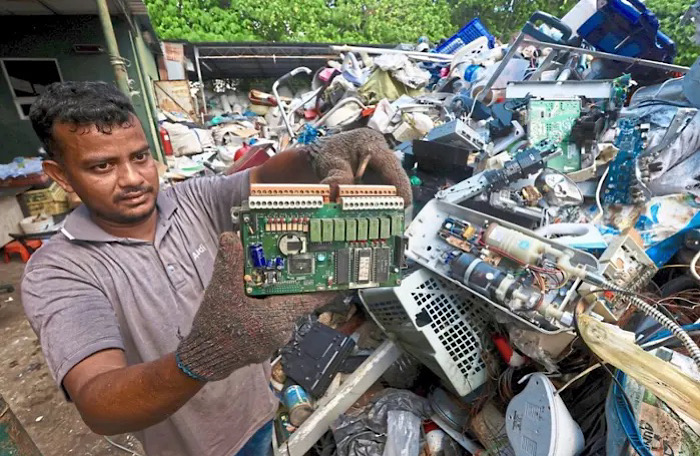A US-made e-waste 'tsunami' hits Malaysia and Southeast Asia
The Basel Action Network raises the issue in a report released just days before US President Trump takes part in the ASEAN summit. Experts believe Malaysia is the new dumping “mecca" for tonnes of e-waste, a business worth over a billion dollars, but with explosive environmental consequences.
Kuala Lumpur (AsiaNews) – The United States sends abroad millions of tonnes of discarded electronic devices and components, in many cases to developing nations, including in Southeast Asia, which are often unprepared to safely manage hazardous waste, this according to a report released yesterday by the Seattle-based Basel Action Network (BAN).
Based on research over two years, the study found that at least 10 US companies export e-waste to Asia and the Middle East in what is a “hidden tsunami”.
This directly concerns Americans since US President Donald Trump is set to attend the summit of the ten-member Association of Southeast Asian countries (ASEAN) scheduled for 26-28 October in Kuala Lumpur, Malaysia.
E-waste includes discarded devices such as mobile phones, tablets, and computers that contain both valuable materials and toxic metals such as lead, cadmium, and mercury.
Since they are being replaced ever more rapidly, global e-waste is growing five times faster than it is being recycled, according to official data.
In 2022, the world produced a record 62 million metric tonnes, which are expected to rise to 82 million by 2030, the United Nations International Telecommunications Union (UNITAR) reported.
“This new, almost invisible tsunami of e-waste, is taking place” at an ever-increasing rate, states BAN’s report, “padding already lucrative profit margins of the electronics recycling sector while allowing a major portion of the American public’s and corporate IT equipment to be surreptitiously exported to and processed under harmful conditions in Southeast Asia.”
US e-waste is added to what already exists in Asia, which generates nearly half the world's e-waste, much of it dumped in landfills without special precautions, with toxic chemicals leaked into the environment.
Some e-waste ends up in informal centres, where workers treat or dismantle the devices by hand, often without protection, releasing toxic fumes and waste.
According to the report, some 2,000 containers or approximately 33,000 metric tonnes of used electronic equipment leave US ports every month.
The companies behind the shipments, described as "e-waste brokers", typically do not recycle the waste themselves, but send it to companies in developing countries without any regard for the procedures they use.
The firms identified in the report include Attan Recycling, Corporate eWaste Solutions or CEWS, Creative Metals Group, EDM, First America Metal Corp., GEM Iron and Metal Inc., Greenland Resource, IQA Metals, PPM Recycling, and Semsotai.
The report estimates that between January 2023 and February 2025, the 10 companies exported more than 10,000 containers of potential e-waste worth more than US$ 1 billion. Industry-wide, this trade could exceed US$ 200 million per month.
Eight of the 10 companies identified hold R2V3 certification, an industry standard designed to ensure that electronics are recycled safely and responsibly, raising numerous questions about the value of this certification.
Many containers are sent to countries that have banned imports under the Basel Convention, an international treaty that prohibits the trade of hazardous waste by non-signatory countries such as the United States, the only industrialised country not to have ratified it.
Tony R. Walker, an expert on global waste trade at Dalhousie University’s School for Resource and Environmental Studies, said that he is not surprised that e-waste “continues to evade regulation”.
While some devices can be legally traded if they are functional, most exports to developing countries are broken, obsolete and mislabelled, destined for landfills that pollute the environment and have little market value.
The scholar cites the case of Malaysia, the rotating chair of ASEAN 2025 and a Basel Convention signatory. Identified as the main destination for US e-waste, it “is being overwhelmed with what is essentially pollution transfer from other nations.”
For Jim Puckett of the Basel Action Network, “Malaysia suddenly became this mecca of junk”. But containers are also arriving in Indonesia, Thailand, the Philippines, and the United Arab Emirates (UAE), despite bans under the Basel Convention and national laws.
23/06/2008
26/08/2022 11:13







.png)










